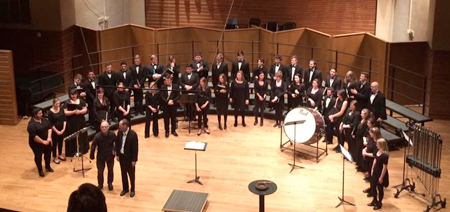by Daniel Hathaway

Good conductors can stop an audience from applauding just as skillfully as they can throw cues to a chorus or orchestra. Without any rubric in the program, Garner conveyed his curatorial theory that Whitacre’s i thank you God, Lang’s the little match girl passion, and Hogan’s We Shall Walk Through The Valley in Peace formed a unified set with a single message.
Whitacre’s setting of an e. e. cummings poem (the poet wasn’t credited in the program) falls into the composer’s signature, sound-cloud style of choral writing. The Motet Choir tuned its luscious harmonies skillfully, and their crisp enunciation brought all of cummings’ inspiring words across.
After the Whitacre, the chorus stepped down from their risers and formed a semicircle at the front of the stage, moving without pause into Lang’s adaptation of a Hans Christian Andersen story after the style of a Bach Passion. Members of the Choir doubled as percussionists, punctuating the story with beats on a bass drum and occasional bell tones on glockenspiels and chimes.
Lang sets the sentimental story of the match girl (her demise and translation to heaven to be with her cherished grandmother) in varying forms of choral recitative, stopping for reflection as Bach does in the form of arias and chorales. A glossy, colorful brochure (alas, too wide to refer to during the performance without elbowing one’s seatmates) pointed out where Lang’s narrative parallels movements in the Matthew Passion — the big work on this year’s festival, to be performed on Saturday evening.
The Motet Choir sang with an astonishing sense of pitch, pulling notes out of the air and tuning chords with skill and confidence. (They’d already had one shot at performing the work during BW’s recent Focus Festival featuring Lang’s works, and that experience paid off.)
Does it work as a piece? As the passion goes on — and on — its concept becomes less and less convincing. Not only would a thoroughgoing study of the two pieces side by side make Lang’s setting seem trivial by comparison, some of the matchings just don’t make sense. Lang’s No. 9 (“Have mercy, my God”) is meant to coincide with Bach’s Erbarme dich, but when you think about it, the match girl doesn’t really have cause for remorse, while Peter has just denied his Lord three times in a row. (Peter didn’t have any opportunity for redemption until Mahler’s third symphony, where the angels invite him to the heavenly banquet many years later.)
Lang flowed directly into Hogan’s lush, hushed spiritual, leaving the end of the first half of the program somewhat up in the air topically, but on a wonderful note of repose.
The short second half was devoted to Bach’s double chorus motet Fürchte dich nicht. The energetic Motet Choir, doubled by strings and winds, produced ringing chords and clear, chiseled counterpoint, all the while looking as though singing Bach was the most fun thing they could be doing at that moment.
Photo: BW Motet Choir with David Lang at the recent Focus Festival.
Published on ClevelandClassical.com April 19, 2016.
Click here for a printable copy of this article


